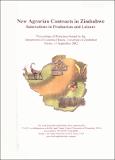| dc.contributor.author | Mufema, Edmore | |
| dc.coverage.spatial | Zimbabwe. | en |
| dc.date.accessioned | 2016-04-26T13:03:56Z | |
| dc.date.available | 2016-04-26T13:03:56Z | |
| dc.date.issued | 2002-09-13 | |
| dc.identifier.citation | Mufema, E. (2002) Making and/ or breaking bonds: aspects of contract sugar schemes and land reform in Zimbabwe. In: McDermott Hughes, D. (ed.) New agrarian contracts in Zimbabwe: innovations in production and leisure: proceedings of workshop hosted by the Department of Economic History, University of Zimbabwe, 13th September. Harare: DEH, pp. 59-73. | en |
| dc.identifier.uri | https://opendocs.ids.ac.uk/opendocs/handle/20.500.12413/11452 | |
| dc.description | A symposium paper on contract sugar schemes in the Southeastern Lowveld of Zimbabwe and their implication in the face of Zimbabwe's land reform programmes. | en |
| dc.description.abstract | This essay examines the origins, nature and implications of contract sugar schemes in the Southeastern Lowveld of Zimbabwe. Contract sugar schemes began in the 1950s with three pilot planters. Today it involves farmers in excess of two hundred owning farms varying in sizes.
The aims of the contract schemes were to put more land into production, allow more people to enter farming, increase production and increase stability and racial harmony. Certain key conditions were stipulated for prospective contract farmers, inter alia, possession of technical sugar production know-how, possession of adequate financial resources and citizens of the country were encouraged. The essay takes the case of one of the pioneer planter to shed light on the nature of contract sugar farming. It examines the issue of economies of scale in sugar production, the terms, conditions and workings of the sugar-milling contract. The paper explores the linkages between sugar farming and the land equation. It considers the breaking of old bonds as some of the old contract sugar farmers are being evicted from the land, and also the cementing of new bonds as new farmers are engaged in the sugar production process. The treatise concludes by examining various options linking sugar production and the agrarian reforms in the country. It suggests a number of options namely, a frontier option where new land and water resources are made available for sugar production, an intensification of existing land use patterns via the creation of small scale sugar schemes and creation of contractual relations between existing and new farmers. The paper concludes by recommending a combined approach to the options and the need for further applied research. | en |
| dc.description.sponsorship | The workshop and research have been sponsored by USAID, in collaboration with the Land Tenure Center (University of Wisconsin, USA)
and as part of the BASIS Programme.
Rutgers, the State University of New Jersey, USA provided supplementary support. | en |
| dc.language.iso | en | en |
| dc.publisher | Department of Economic History ; University of Zimbabwe | en |
| dc.rights.uri | http://creativecommons.org/licenses/by-nc-nd/3.0/ | en |
| dc.subject | Agriculture | en |
| dc.subject | Rights | en |
| dc.title | Making and/ or breaking bonds: aspects of contract sugar schemes and land reform in Zimbabwe | en |
| dc.type | Conference paper | en |
| dc.rights.holder | University of Zimbabwe's Department of Economic History. | en |


